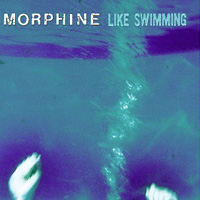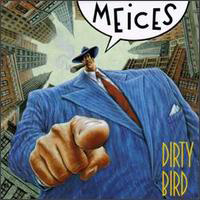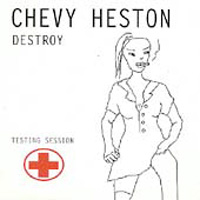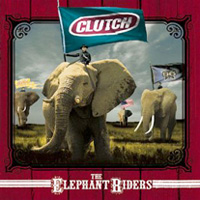 Morphine
Morphine
Like Swimming (Dreamworks)
An interview with sax player Dana Colley
by Nik Rainey
Morphine is the kind of band that makes you want to smoke. The dusky swing of this Boston trio plays like the soundtrack to a noir classic performed entirely underwater, owing to a totally unique blend of wobbly instrumentation (though a few bands, like the Presidents of the United States of America, have bowdlerized their mixed-string instruments to far less enthralling ends). Their fourth album and the first under the combined auspices of longtime label Rykodisc and mega-imprint Dreamworks, Like Swimming (also the name of one of vocalist/ two-string slide bassist Mark Sandman’s many side projects), can only be described as Morphine-esque (though the definition of that adjective continues to morph with each release). From somewhere deep in the Mountain Time Zone came the voice of baritone saxophonist Dana Colley, a man who obviously doesn’t suffer fools (or rock journalists, merely a subset of the same) lightly.
I’m gonna start off by asking you the question you’re probably very sick of being asked right now, just to get it out of the way…
How can you say that? How can you start off a conversation with that kind of statement, “I’m gonna ask you the question that you hate the most?” Why don’t you just give me the question?
…okay. The question is about your new deal with Dreamworks. How did it come about, did it affect your relationship with Rykodisc…
Did it affect things with Ryko? Yes. But on some level, it’s sort of a merger between the two companies, they’re working together on it. We actually signed the contract after our Ryko deal was finished, but they agreed to get behind it and push it in tandem.
So is this the last record on your Ryko deal?
No, actually we have one more with them, but they’ll share that one as well. Okay, we got that out of the way. Whew!
You have one of the most unique and certainly most readily recognizable sounds of anybody in modern music. Do you find it hard to keep it fresh, to keep yourself from settling into a cul-de-sac at all?
Oh, you mean like all the other baritone sax/ two-stringed bass combos out there? No, as far as we’re concerned, we’re musicians who are constantly trying to push the boundaries of who we are in terms of our expression, and I don’t feel there’s a limit to that. As we develop as musicians, we progress as a band as well.
How do you think this album differs from your previous three?
I don’t know, really. For us, it’s like we play, we record, we accumulate material continually. It’s a constant process of record/tour/ record. So our albums are documentations of what we’re doing at the time. It differs by comparison, but it’s nothing premeditated. You have to allow the music to dictate it and let whatever’s in front of you become the song. Sometimes things will sit next to each other and connect in ways you might not have anticipated, but it has to be an organic process or it won’t work.
Are you finding a different response now that you have major backing? Are their efforts resulting in different or larger crowds than before?
We’re definitely experiencing a very well-honed distribution system that’s managed to get the record, the profile of the release, and the tour culminating at the same time. To be able to tour the U.S. with the kind of cumulative support that we’ve been getting really seems to make a difference. As for the audiences, so far maybe one-half of the shows on this tour have sold out. So something’s happening out there.
I’m checking out the credits here and I gotta ask – what’s a “double sax?”
I don’t know if you’re familiar with Rashaan Roland Kirk, but in his style I play the baritone and the tenor sax simultaneously. Mark was the one who gave it the name “double sax,” probably to enduce further mystery and intrigue.
Which it has, as you can see. And I’ve been hearing a lot about the instrument Mark invented that he plays on the record…
The tritar. It’s basically a bass string and two guitar strings together, played with a slide. It almost gives the impression of two guitars playing together with a bass, but then the accompaniment of the higher strings gives it an aspect that’s pretty scary-sounding. You can hear it featured on “Murder For The Money.”
What has influenced the shape of your personal sound the most?
For me, it’s a constant search just to try and get the instrument to sound good. I listen to a lot of different sax players and study their techniques, Coltrane especially. I don’t play a lot of Coltrane but he’s affected the way I approach my instrument the most.
Any particular period of Coltrane?
The whole thing. Obviously I like some better than others, but there’s not much he’s done that I can’t understand or appreciate. But specifically records like Coltrane Jazz, Lush Life with Johnny Hartman…
Do you dig his more radical Pharaoh Sanders-era stuff like Meditations?
Yeah, I don’t mind that. I wouldn’t put it on nearly as much, ’cause it’s got kind of a harsher vocabulary, it’s almost painful.
And yet spiritual at the same time.
Well, his spiritual nature is certainly one thing that drove him and guided him, but that’s not the aspect that inspires me so much. It’s the sound. The person, the being, and the sound. It all rises up in such a rapid, ferocious way that’s undeniably his. You have to sit up and notice that this is a person and not just an instrument playing.
Mark has a number of side projects, I know – do you have much going on outside of the band?
Here and there, sure. I’ve done some work with a band called Lars Vegas and aided with the Kerouac – kicks joy darkness album with Lee Ranaldo from Sonic Youth. That’s a record I really wanted to be part of, there’s so many great people on it. Jim Sampas from the Kerouac Estate up in Lowell is the man who made it all happen. He’s been working hard for a long time to get it together and put it out there. Ryko’s putting it out sometime in April, I think.
Got any soundtrack work lined up for the near future? It seems like such a natural extension of what you already do.
Not that we know of. As the record gets around, the powers that be might get interested in us. Who knows what they’ll do. But no, no offers yet. But it’d be fun to do it, to get in the studio with the rushes running, jamming and trying to figure out what works best for the scenes. … Did I use the word “jamming?”
Yes, you did. Is that a word you prefer not to use?
No. I’ve had sort of a personal attack today over the use of that word, but… that’s nothing you need to concern yourself with.
Any last words before we go, Dana? Wisdom? Advice?
Um, eat salad, finish your greens, love your parents… Who knows? What the hell do I know? Just “follow your bliss,” as Joseph Campbell said. That ought to do it.



